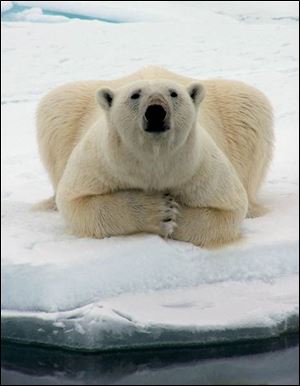
Polar bears: why we should care
12/30/2006
This polar bear was sitting quite comfortably as it watched a whaling crew off shore near Barrow, Alaska last May.
MIDDLE-aged women won't be the only ones suffering from hot flashes by the end of this century. Temperatures in the Arctic are predicted to rise another 13 degrees and, unless more environmental protection measures are put in place soon, it will be too hot in more than just summer for the world's polar bears.
So, now that I have your attention, you heard the other day that the Bush Administration finally admitted - well, sort of grudgingly acknowledged - that global warming exists. If temperatures in the Arctic are rising, then global warming is the cause. Scientists know that because the sea ice is melting, and it's adversely affecting polar bears. The animals are not living as long anymore, they are thinner these days, they have fewer cubs, and their survival looks bleak without intervention.
That's why programs like the one at the Toledo Zoo are so important. They study the bears to learn about their survival. Toledo's adult polar bears - Crystal, Nan, and Marty - are related to bears in the wild whose existence is threatened. Marty is the father of Crystal's twin cubs and Nan's cub, all born last month.
When the White House offered to propose listing the bear as "threatened" under the Endangered Species Act, it didn't do so out of the good of its political heart. It was up against a wall. The administration faced a court-imposed deadline requiring it to decide by Wednesday, Dec. 27, whether polar bears deserve protection under the Endangered Species Act. The Department of Interior earlier this year settled with three environmental advocacy groups that criticized government for failing to promptly respond to the bears' predicament.
Interior Secretary Dirk Kempthorne said, "There is concern that their habitat may literally be melting."
Bulletin to Secretary Kempthorne: Their habitat is melting. Scientists blame carbon dioxide from auto and coal-fired power plant emissions for pushing temperatures up. And don't you feel like blaming global warming for this unseasonably warm winter?
Polar bears use the sea ice as they hunt for food. Although the male bears don't weigh as much as they used to - on average, 1,800 pounds - the bears are still huge and are strong swimmers. However, long-distance swimming is not their forte. They are better at swimming short distances. But with fewer ice floes, they are forced to swim long distances and some are drowning.
Four polar bear carcasses were found in the sea off the north coast of Alaska in one month recently. Authorities believe more bears will drown because there's less ice for them to hunt and live on. In fact, the National Center for Atmospheric Research says that in a worst-case scenario, summer sea ice could disappear by 2040, only 33 years away.
Polar bears are among the animals that Americans adore. They are must-sees on trips to the zoo, and youngsters - and sometimes oldsters - enjoy getting stuffed polar bears as gifts.
But why on the eve of New Year's Eve, or at all, should anybody be concerned about polar bears?
After all, there's plenty else much closer to home to fret about. And besides, HIV/AIDS is ravaging whole African nations and American communities; we're in a war that nobody but the President wants to stay in; children are starving to death in Africa, and America's social injustices - for starters, public education still needs surgery, there's still no universal health care plan, and the status of the working poor isn't getting better - stick to society like bad company that never wants to leave.
Andrew Wetzler, the senior attorney for the Natural Resources Defense Council, one of the groups instrumental in getting the government to act on the status of the polar bears, said the Bush Administration's proposal is "a loud recognition that global warming is real." He added, "It is rapidly threatening the polar bear and in fact, an entire ecosystem, with utter destruction."
Let me say this, then: If polar bears' existence is threatened today and too little is done to increase their numbers - there are from 22,000 to 25,000 now - then what mammal's existence could next be threatened?
Who knows for sure? But realize this: Continued disregard for global warming could eventually seriously affect you, me, and the rest of the human race.
With that I bid you Happy New Year.
Rose Russell is a Blade associate editor.
E-mail rrussell@theblade.com